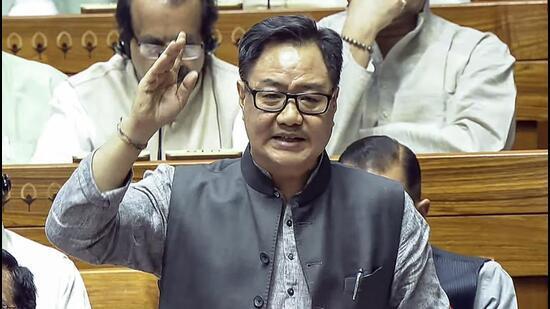
Opposition Creates Confusion & Leaves House: Rijiju in Rajya Sabha
The ongoing debate in the Rajya Sabha on the Waqf (Amendment) Bill took an interesting turn when Union Minister Kiren Rijiju criticized senior members of the opposition for creating confusion and raising issues in the House without staying back to listen to the replies. The minister’s remarks were made during the discussions on the bill, which aims to strengthen the Waqf Board and ensure its proper functioning.
Rijiju, who is the Minister of State for Youth Affairs and Sports, targeted senior Rajya Sabha members, including Kapil Sibal, for creating confusion and not staying back to listen to the replies. According to Rijiju, Sibal had compared the properties of Waqf bodies with those of other religious bodies, which he believed was an attempt to create confusion and mislead the House.
The minister’s comments were made in response to Sibal’s remarks, who had questioned the government’s intentions behind the Waqf (Amendment) Bill. Sibal had argued that the bill was an attempt to undermine the autonomy of Waqf bodies and give more power to the government. However, Rijiju dismissed Sibal’s concerns, saying that the bill was aimed at strengthening the Waqf Board and ensuring its proper functioning.
Rijiju’s comments were met with strong opposition from the opposition benches, with several members demanding an apology for his remarks. However, Rijiju stood by his comments, saying that he was only pointing out the truth and that Sibal’s remarks had created confusion in the House.
The debate on the Waqf (Amendment) Bill is an important one, as it aims to address the long-standing issues faced by Waqf bodies across the country. These bodies are responsible for managing and administering properties and assets belonging to Muslims, and have been facing several challenges, including encroachment and mismanagement.
The bill proposes several key reforms, including the appointment of a chairperson and members of the Waqf Board through a selection committee, as well as the establishment of a tribunal to deal with disputes related to Waqf properties. However, the opposition has raised several concerns about the bill, including the lack of representation for minority communities and the potential for misuse of the bill.
Despite the controversy surrounding the bill, the government is keen to push it through and has secured the support of several opposition parties. However, the debate on the bill is likely to continue, with several opposition members expected to raise more questions and concerns about the bill.
In conclusion, the debate on the Waqf (Amendment) Bill in the Rajya Sabha highlights the complex and contentious issues surrounding the management of Waqf properties in India. While the government is keen to push through the bill, the opposition has raised several concerns, including the potential for misuse and the lack of representation for minority communities. As the debate continues, it remains to be seen whether the government will be able to address these concerns and ensure the passage of the bill.






